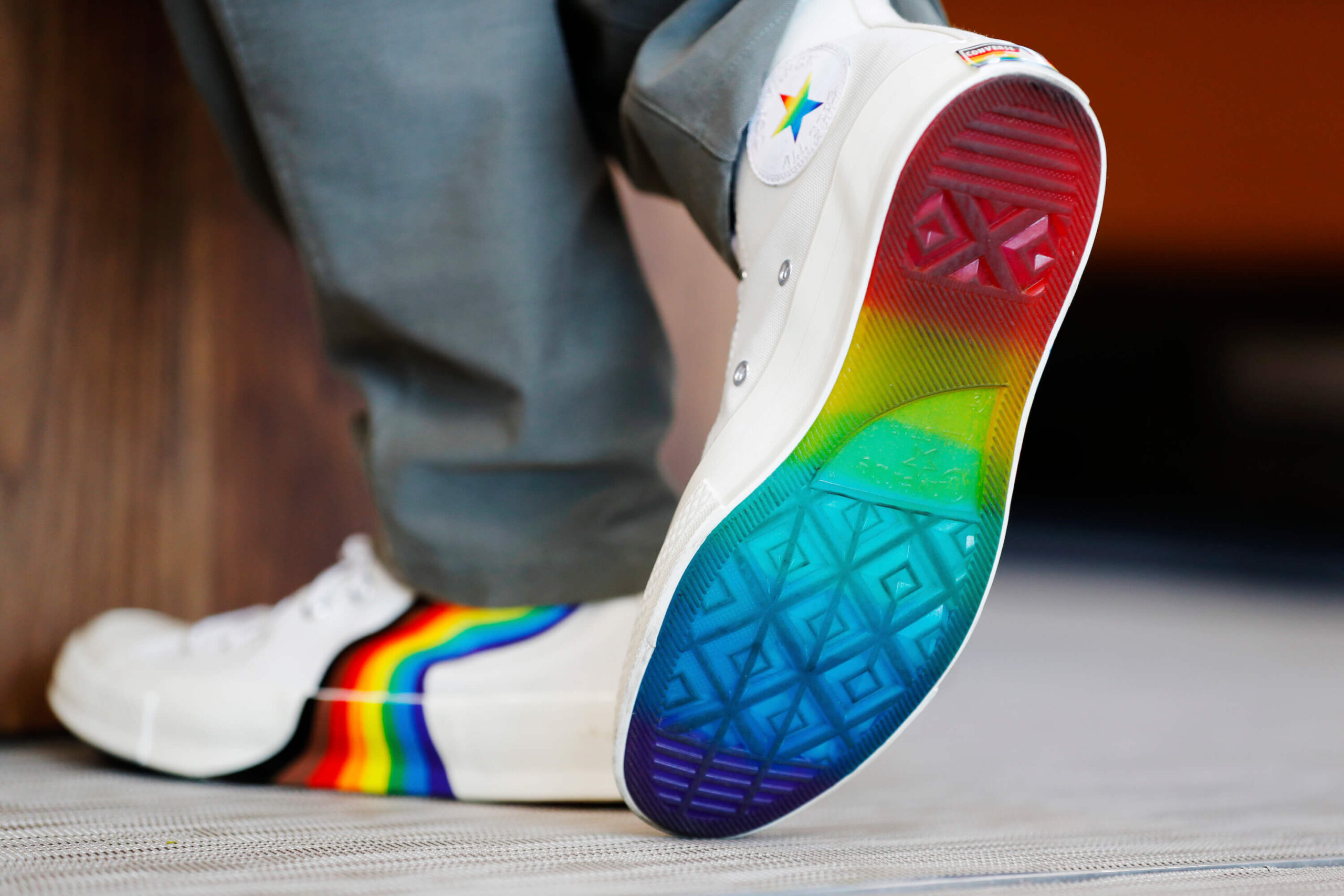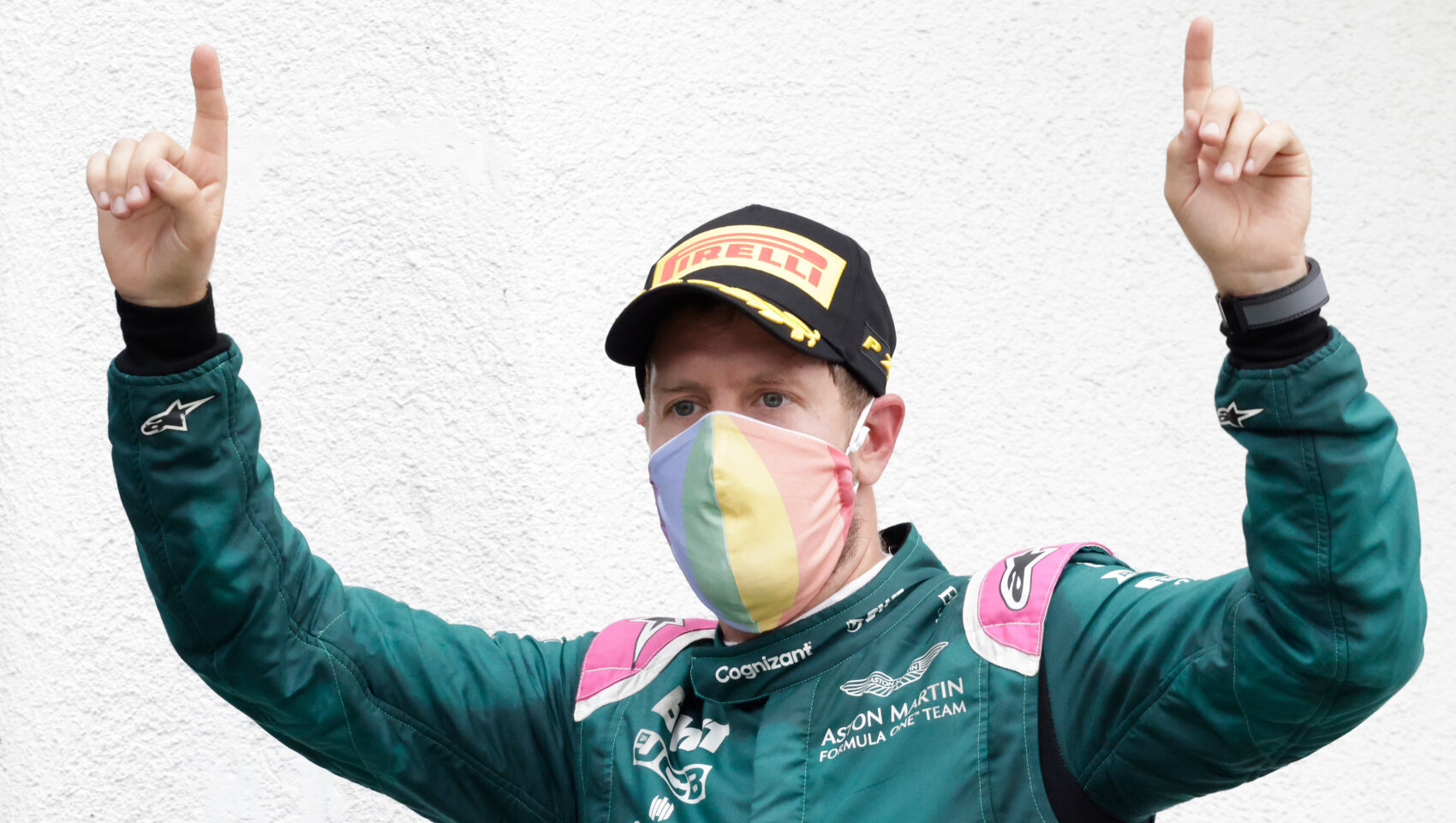Just weeks after Hungary’s government banned any LGBTQ2S+ portrayal in educational material intended for anyone under 18 years old, including on television shows, four-time world champion Sebastian Vettel arrived for the country’s Formula One race prepared to make his views clear.
The German driver brought a helmet painted with the rainbow flag for the race, a “Same Love” T-shirt for the pre-race ceremonies, a rainbow mask to wear for the weekend and some choice words for Hungarian Prime Minister Viktor Orbán.
“I find it embarrassing for a country which is in the European Union having some laws like this,” Vettel said in an official Hungarian Grand Prix press conference on Thursday before the race.
“We’ve had so many opportunities to learn in the past and I can’t understand why we’re struggling to see that everybody should be free to do what they like, love who they like. It’s obviously not for us to make the law, and that’s not our role, but I think just to express support for obviously those that are affected by it.”
In addition to delivering a verbal lashing, the Aston Martin Cognizant F1 team driver sported Pride-themed running shoes for the press conference, which he also wore on his Thursday “track walk” inspection of the Budapest circuit.
Three days later, on race day, the rainbow-themed “Same Love” T-shirt got Vettel in trouble with the sport’s governing Fédération Internationale de l’Automobile because he failed to remove it before the playing of the national anthem, as the rules require. That reprimand elicited more defiance from Vettel: “They can do whatever they want to me. I don’t care, I would do it again.”
The sanction appeared to be an odd reaction from a sport that launched a “We Race As One” awareness campaign last season, complete with a rainbow logo. But F1 suddenly ditched the rainbow early this year causing many to theorize that the racing body wanted to appease those host countries not comfortable with the symbol taking centre stage at their national events.

Credit: Courtesy of Aston Martin Cognizant F1 Team
In the wake of the sport seemingly softening its commitment to LGBTQ2S+ issues, Vettel’s willingness to be an ally certainly resonates with some F1 fans.
“Seeing Seb speak up and wear Pride colours at venues where LGBTQ2S+ persons are undergoing hardship means a lot to me,” says Canadian F1 follower Brock Bolton. “I think for young LGBTQ2S+ fans, it’s critically important that they know they can be themselves and feel welcome at races.”
Vettel wasn’t alone in offering support for Hungary’s LGBTQ2S+ community. In the run-up to the race, U.K.’s reigning seven-time world champion, Lewis Hamilton, took to Instagram to call out the legislation as “unacceptable and cowardly” and stress that “everyone deserves to have the freedom to be themselves, no matter who they love or how they identify.”
Having two drivers come out in support of queer and trans communities marks a huge change in culture in a predominantly conservative-minded sport that has failed to offer an LGBTQ2S+-friendly space over the years. Since the F1 world championship began in 1950, only three people known to be LGBTQ2S+ started a grand prix: Mário Veloso de Araújo (Nicha) Cabral raced in the late 1950s and early 1960s and came out as bisexual late in life, while Mike Beuttler, who was not openly gay while in F1, as well as Lella Lombardi, both raced in the 1970s.
Although things are changing in some areas, F1 gets low marks for its concern for human rights in general. Many in the paddock still contend that politics has no business in the sport, and a poor human rights record or regressive LGBTQ2S+ stances should not disqualify a country from hosting a race.
“For young LGBTQ2S+ fans, it’s critically important that they know they can be themselves and feel welcome at races.”
F1’s brain trust certainly seems to agree: it recently signed long-term deals for races in Qatar and Saudi Arabia, which have inaugural events in late November and early December, respectively. Sadly, it means that Vettel will likely have many more opportunities to wear his Pride shoes in protest on race weekends since nine of the 23 races in 2022—almost 40 percent—will take place in countries with poor records on human rights and freedoms, including LGBTQ2S+ rights.
The nine will go up by at least one in 2023 when Qatar returns to the F1 calendar after a one-year hiatus to host the 2022 FIFA World Cup. That event came under fire from British Olympian Tom Daley, who wants a boycott of the soccer tournament due to Qatar’s “extreme rules against LGBT people and about women.” Daley, who won gold and bronze in diving at the 2021 summer games in Tokyo, also wants any country that criminalizes homosexuality to be barred from Olympic competition.
All of it has Vettel feeling that the sport needs to take a long look in a mirror.
“People in charge need to ask themselves the question: Do you have a moral? Do you therefore say ‘no’ to certain things? Or do you just say ‘yes’ to any big deal that’s around the corner, but for the wrong reasons? I think that’s the bigger picture stuff,” he said at the Turkish Grand Prix in early October.
“Certain countries I think are no-go: we go to some of those places, and we roll out a huge carpet with nice messages on it, but I think it takes more than just words, I think it takes actions.”


 Why you can trust Xtra
Why you can trust Xtra


